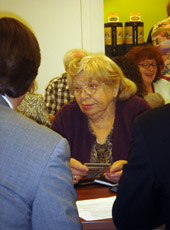The Bus
Permanent link

Polly, on the other side of the long bus ride
I recently returned from a JUF Mission to Israel, which was great. But this story isn’t about The Wall, the Dead Sea, or the falafel, although they all deserve a shout-out.
I’d extended my trip and decided to go up north to the Golan region with Melanie, a new friend I met on the Mission. We were going to Kfar Blum, a hotel on a kibbutz, where we could go white water rafting, hiking and biking. After this hectic trip, I just wanted to sit, but I pretended to be all athletic-y as the arrangements were made.
But this story takes place even before we got there.
The day after the Mission ended, we went to the Central Bus Station in Jerusalem, bought our cheese and olive sandwiches, and boarded the bus for the long ride to Kiryat Shmona.
And this is where the story begins.
I sat with Melanie. An orthodox woman in front of us had two kids with her, a 4 year-old boy and a baby girl. As soon as she spoke to her son, we knew she was born in the U.S.
We started talking. She’s from a conservative family in Long Island, and came to Israel for the first time at 19.
She made aliyah at 22 and was given a choice of ulpans to attend, not religious, or orthodox.
She chose orthodox, which clearly shaped her life. She got married, and in addition to these two kids, has four more at home. When asked how many she wanted, she said, “As many as come.”
My guess is she’ll have 14 kids. Although a few sets of twins would really get her numbers up. How dramatic if her last pregnancy was triplets? And what if she also became a grandmother on that very day?
Back to the actual conversation.
“So,” she said, “are you married?“
Nope, we said. Not yet. Just haven’t found the right guy. But hopefully, someday. Big smile, followed by little giggle to illustrate positive attitude … and scene.
She asked why it was so difficult to meet guys in Chicago. We shrugged. She suggested we move to another city.
“I’ve moved for a relationship,” Melanie said, “and it didn’t work out. I’m not doing that again. I’ll move for work, but not a guy.”
“I’ve lived in another city, too,” I said, “and it was just as hard there, so I don’t think Chicago’s the problem. It’s hard to meet someone that you connect with no matter where you are.”
The orthodox woman – we never found out her name, so I’ll call her Bracha instead of “the orthodox woman” – said it doesn’t have to be so hard; if you want to get married, you get married.
Melanie said, “I want to marry for love, not just to be married. I’m not getting divorced.”
“So you assume you’ll get divorced, instead of working on a marriage?” asked Bracha.
As the conversation turned to pre-nups, I looked around to see who else was on the bus. It was the only way to walk away from a conversation while on a moving vehicle.
There was a woman sitting on the armrest of the seat behind me, talking to people across the aisle. I later learned they were her sister, baby niece and mother.
This woman smiled at me. I smiled back.
“Shalom,” I said.
In accented English, she asked “Where are you from?”
“Chicago,” I said. “Illinois. In America. You?”
“Jerusalem,” she said.
I said, “I’m glad you speak English, because I don’t really speak Hebrew.”
“Me, either,” she said. “I speak English and Arabic.”
Here’s the Israeli experience we paid our 57 shekels for: An ultra-orthodox Jewish woman in front of us, an Arab woman behind us. They never acknowledged each other.
“My husband and kids are here, too,” said the Arab woman – I’ll call her Taaj, because it’s Arabic and I like it – as she gestured to the back of the bus. “He’s visiting from Virginia. He works in a restaurant.” Every year, he visits for a month, she goes there for a month.
“So,” she said, “how do you like Palestine?”
She said it with a twinkle in her eye. It was a conscious choice of words.
I rejected my first instinct, which was to say “Palestine? You mean Israel? It’s only awesome.” That may come across as sarcastic and/or glib. Given that I wasn’t 14 and this wasn’t my mom, it seemed like the wrong approach.
But if I said, “It’s beautiful,” then I’d be tacitly confirming that this land is called Palestine. So I said:
“This is a really beautiful country.”
By saying “this,” I was referring the actual land that is Israel. Of course, she referred to “this” land as Palestine, so the subtle distinction I was making may be lost on her, but crunched for time, I went with it.
I turned back to Melanie as Bracha said, “Marriage is a lifelong commitment, the most important relationship of your life. Your husband must come first, before your kids.”
”I disagree,” said Melanie. “My kids would always come before my husband.”
I chimed in: “That’s a hard one, but I’ve heard that if parents put each other first so they each feel valued and important, then that can only be better for the kids.”
Watching Seal and Heidi Klum tell Oprah the secret to their dreamy marriage has certainly come in handy. I sound so wise.
“My kids would always come before my husband,” said Melanie. “No question.”
Oy.
I turned back around to Taaj.
“That’s Jenin,” she said as she pointed into the distance. “Arab city.”
“Uh-huh,” I nodded. “That’s nice.”
“Arabs,” Taaj said again. “The whole city.” I’m glad she elaborated, because “Arab city,” wasn’t descriptive enough.
I turned to hear Melanie say, “But why should I have to give up a career I love in order to be with a man? I may not get married, so isn’t that even more of a reason to have a great career, so I can take care of myself?”
Bracha said, “But you are incomplete without a man. A man completes you.”
Oh no she di’int!
Would it be wrong to fling myself into the overhead storage compartment? If it went smoothly, it seemed the perfect way to disappear. If it didn’t, watching me pull myself up into the bin could get awkward. Dammit! I’m doomed by my inability to do a pull-up! I could stand on the chair back for leverage. Or I could get a boost from someone. Bracha’s 4 year-old looks sturdy… although his glasses are pretty thick. If those suckers fell off, he’d be no help at all.
A quick, quiet getaway seemed unlikely. So there I sat.
Melanie said, “I don’t need a man to feel complete.”
For the record, I agreed with almost everything Melanie said, but it seemed beyond frustrating to convince Bracha – who had rejected an upbringing probably similar to our own – that we were actually complete beings without a man. She would quote the Torah, we’d quote common sense and a few self-help books, voices would be raised, and we’d all be incredibly annoyed.
I turned back to Taaj.
“Where are you going?” she asked.
“Kiryat Shmona, then taking a cab to a kibbutz for a few days,” I said.
Please don’t ask me where, please don’t ask me where.
I was suddenly worried about giving her too much information. Then I was annoyed with myself for being worried. Did I really think that Taaj, her husband, 3 kids, sister, niece, and elderly mother would follow us? We’re just not that interesting.
Still… please don’t ask me where I’m going…
“That’s near Lebanon,” she said.
“Yep,” I said. “I know.”
“Lebanon,” she said again, with that same twinkle. “But you’ll be fine.”
She said this as though she called Lebanon and asked it not to bother us. Taaj loves freaking me out.
Her 9 year-old daughter came over to sit with her.
Scanning brain for generic topic… got it:
“Do you like Hannah Montana?” I asked her.
She said yes just as we pulled into a rest stop.
I paid my sheckel for the bathroom and used that time to strategize. Here’s the situation:
We have Bracha disappointed that it’s 2008 and women are complete beings, and Taaj gleefully telling me about the Arab-ness of the region. Neither conversation was remotely appealing.
I could talk to Taaj’s daughter about Hannah Montana, but really, what’s left to say?
There was only one solution.
When we got back on the bus, I took a nap.
Polly Levy spent 8 years in Los Angeles where she wrote for Suddenly Susan, and was a Script Coordinator for Frasier, Gilmore Girls and some other TV shows no one has ever heard of.
Now living in Chicago, she is a Senior Content Producer at NogginLabs, where she writes online e-learning courses. In addition, she freelances for the website development company Azavar Technologies.









.jpg)



